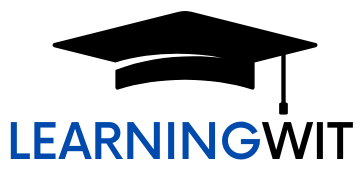Mindvalley is a learning platform focused on personal growth: meditation, productivity, relationships, fitness, spirituality, and entrepreneurship. They sell “Quests” — multi-week programs created by external teachers (think: structured courses designed to be done daily for 21–30 days). The company bundles many Quests into a “Membership” that gives access to the platform, community groups, live sessions, and meditations. The site positions itself as transformational rather than merely informational.
The “free trial” question: what you actually get
Many sites and bloggers call Mindvalley’s 15-day refund policy a “risk-free trial” — and that’s the closest thing to a trial the platform offers. In plain words:
- No standard unlimited free trial without payment for the full membership. Instead, you pay (or subscribe) and then have a 15-day window to request a full refund if it’s not for you. During that 15 days you have full access to the content you paid for.
- Mindvalley also offers free masterclasses or sample lessons and occasionally “free Quest lessons” you can access by signing up with an email — these are genuine free previews that can help you test the teaching style. But they’re bite-sized; they’re not the full membership experience.
So: if you want to try everything risk-free, you can — but you must sign up and then use their refund policy if you’re not satisfied. A few review sites call this a “15-day risk-free guarantee” rather than a free trial.
What’s included during that 15-day period?
If you buy a membership (or a Quest) and are within the 15-day refund window, you typically get:
- Access to all available Quests in your plan (video lessons, downloadable materials, guided meditations).
- Entry to community groups related to each Quest — small private groups where people share progress and insights.
- Live calls, mentoring events, and occasional workshops (depending on what’s scheduled that month).
All of that is accessible immediately — which is why many users can get a solid feel for the platform within two weeks.
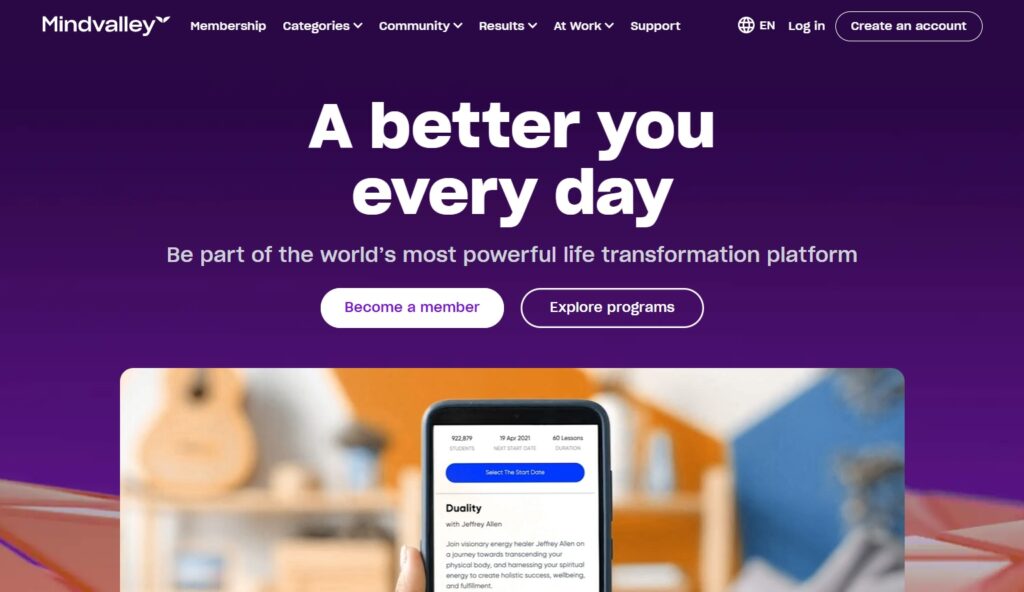
The content: how good is it?
Short answer: the production and presentation are top-notch. The longer answer:
Strengths
- High production values. Videos look and feel professional — they often include high-quality graphics, film-style editing, and polished slide decks. This creates an engaging learning experience. (You’ll notice this immediately after a lesson or two.)
- Big-name teachers and signature methods. Mindvalley hosts well-known figures in the self-growth world, each with a unique framework (e.g., meditation methods, productivity systems). If a teacher’s style clicks with you, it can be deeply motivating.
- Short, daily lessons (microlearning). Quests are designed to be done in 10–30 minute daily segments — this helps with habit formation.
Weaknesses
- Variable depth. Because Quests are focused on transformation and habit formation, they can sometimes prioritize practice and motivation over deep technical rigor. If you want academic-style depth or evidence-heavy training (like in a university course), Mindvalley won’t always meet that expectation.
- Marketing tone. Some people find the tone too salesy or hyperbolic — a problem when you prefer a low-key, academic style. Expect upbeat language and strong claims framed around life-change. Various reviewers note this as a stylistic mismatch for certain learners.
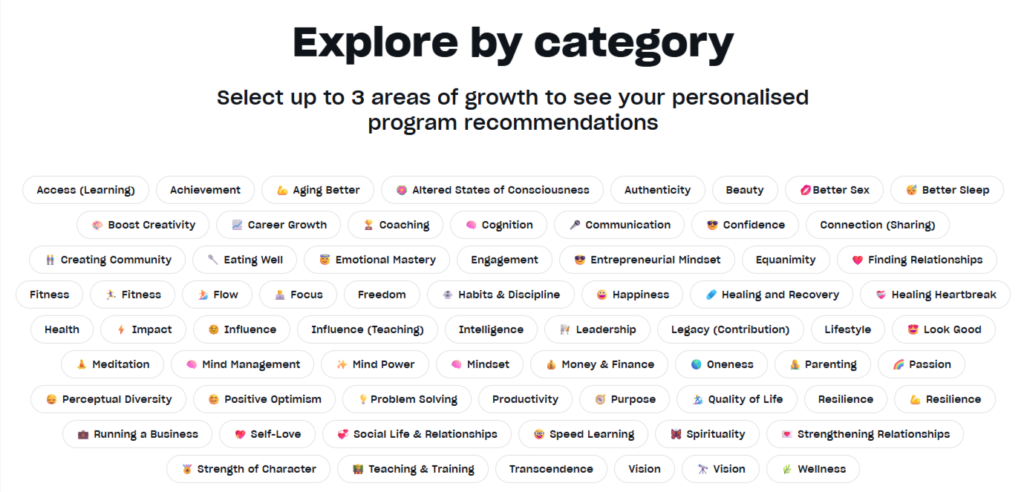
Teachers & teaching style
Mindvalley curates courses by a network of authors/teachers. The format often follows this pattern:
- Short video teaching + an exercise to do that day.
- Community prompts (share your small wins).
- Weekly recap or a live session with the teacher.
If you like coaching-style, personally applied programs (daily practice, journaling, short theory + exercise), the format works well. If you prefer academic lectures or long-form deep dives, the Quests may feel lightweight.
Community & social features — are they worth it?
One of Mindvalley’s selling points is the community:
- Each Quest has a private group where learners post their results, questions, and reflections. For many people, this social pressure and shared journey is motivating.
- There are also live events and occasional flagship conferences (e.g., Mindvalley Live), which bring the community offline for networking and shared workshops. Some users report life-changing connections from these events.
Community can be a huge multiplier — but results depend on how active you are. Passive users rarely get the full benefit.
Pricing, plans, and the “$1.36/day” claim
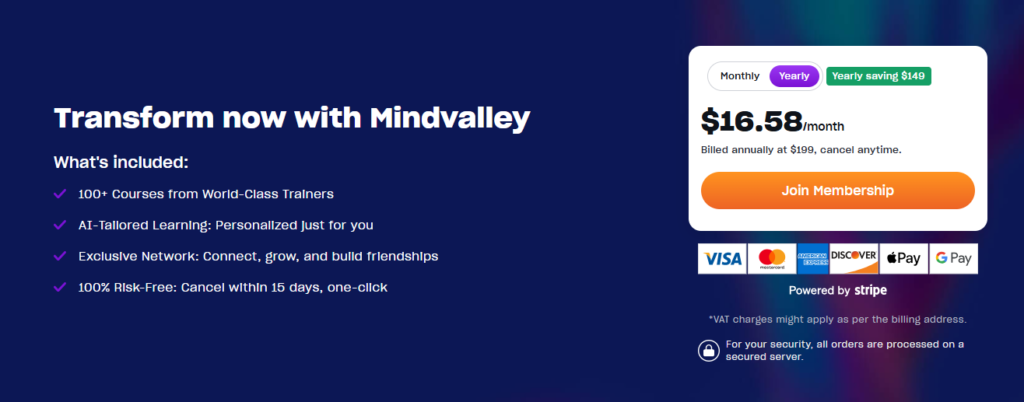
Pricing changes over time and Mindvalley runs frequent discounts and promos. The company often markets the Membership as a cost-effective way to access all Quests for a yearly or monthly fee, sometimes framed as “less than $2/day” or similar. That marketing angle is real — but the exact per-day number depends on promotions and the plan you choose. Always check the final checkout price for your currency.
Important: some third-party reviewers emphasize that the platform has upsells (events, paid live workshops, or “Mentoring” subscription layers). Factor those into your budget if you might attend extras.
Refunds, cancellations, and billing — the ugly truth
This is where things get messy for some users.
What Mindvalley says: They offer a 15-day money-back guarantee. If you request a refund within 15 days, you should get your money back. The official Help pages describe the refund policy and how membership access is removed after refund.
What users report: While many users get smooth refunds, a not-insignificant number report issues:
- Difficulties canceling auto-renew subscriptions.
- Delays or back-and-forth with customer support for refunds or charges for regional currency conversion fees.
- Complaints on Trustpilot and Reddit include both successful refunds (people who praise the policy) and complaints from those who missed the 15-day window and then struggled.
Practical takeaway: If you plan to “try” Mindvalley under the refund policy, mark the refund deadline on your calendar the moment you subscribe. Request refunds via the official help page or support portal and keep screenshots/emails. That minimizes friction.
Credibility, controversies, and “cult” talk
You’ll see strong opinions online. A few themes:
- Transformational language and community intensity can trigger “cult” accusations in forums. This is generally about tone and group identity, not illegal activity. Most mainstream reviews find Mindvalley to be a legitimate company offering legitimate coaching content.
- Regulatory complaints: the BBB lists customer complaints (billing/refunds being the most common). That doesn’t mean the company is fraudulent — it means some customers had frustrating experiences. Many of those were apparently resolved after escalation.
So — expect strong feelings on both sides. The best filter is your own test: try a few free masterclasses, buy one Quest or a short membership, and evaluate whether the teacher and style match you.
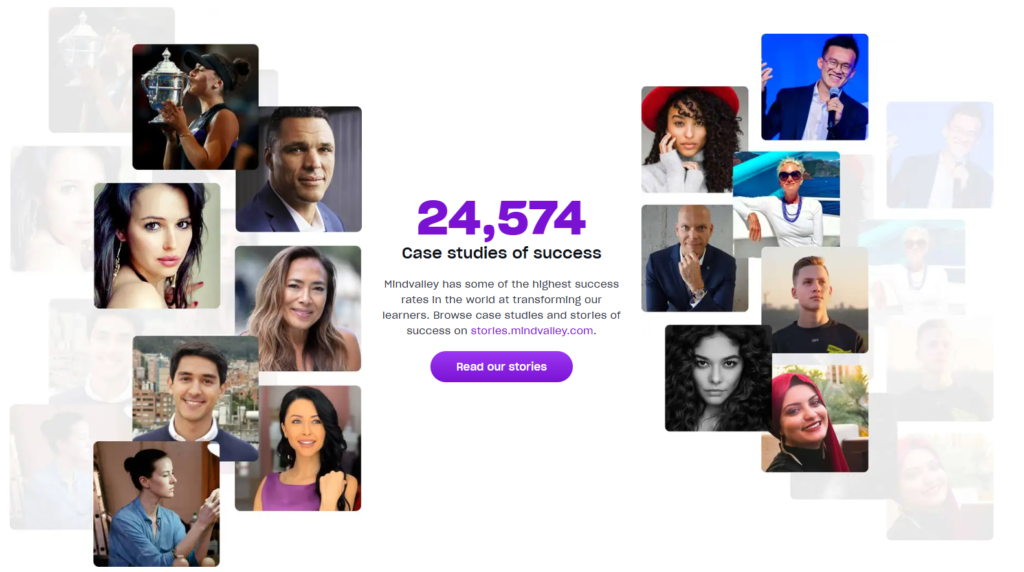
Real user experiences: what people liked most
From Trustpilot, Reddit, and independent reviews, common positives include:
- Life-changing insights: Many users say specific Quests (meditation, mindset, relationships) gave them breakthroughs.
- Motivating format: Daily micro-lessons and community posts create accountability.
- High-quality production and design: Makes learning feel premium and keeps people engaged.
Real user complaints: what to watch for
Also recurring:
- Billing surprises / auto-renewal: People who forgot to cancel complained. Mark your calendar.
- Customer support delays: Some reported long response times for refunds or billing disputes.
- Not academic enough for some: If you’re looking for deeply technical content, Mindvalley can feel lightweight.
How to get the most value from a Mindvalley trial (15 days)
If you decide to buy and use the 15-day refund window as a trial, here’s a practical game plan:
- Decide your goal in advance. Is it better sleep? Stronger focus? Daily meditation habit? Pick one primary objective. This makes it easy to test whether Mindvalley helps.
- Pick 1–2 Quests that align with that goal. Don’t scatter into five different topics; depth beats breadth in 15 days.
- Schedule daily time. Commit to 10–20 minutes a day for two weeks. Microlearning works only if you actually do it.
- Join and participate in the Quest community. Post one check-in to experience the social momentum.
- Mark refund deadline on day 14. If you’re not happy, request the refund early. Save email/chat transcripts.
Follow these steps and you’ll know quickly whether Mindvalley suits your learning style.
Alternatives — who else to consider?
If Mindvalley’s style or price isn’t right, alternatives depend on what you want:
- For structured skill learning (coding, business, design): Coursera, Udemy, edX.
- For creative or practical skills with community: MasterClass (celebrity instructors, high production) or Skillshare (short practical classes).
- For meditation & habit apps: Headspace, Calm (focused on meditation rather than broad personal-growth “quests”).
Mindvalley’s niche is transformative personal-growth programs combined with a community — that mix is what sets it apart.
Final verdict — who should try Mindvalley?
Try Mindvalley if:
- You want daily, habit-forming, coach-style programs (meditation, relationships, peak performance).
- You’re motivated by community and accountability.
- You like high-production lessons and inspirational teaching.
- You’re willing to put in committed daily time for at least two weeks to judge it fairly.
Skip or be cautious if:
- You only want technical depth or academic-level instruction.
- You hate subscriptions or auto-renewals and won’t carefully track refund windows.
- You want free, short-term content without committing your card (there are free masterclasses, but not a full paid free trial).
Useful links & next steps (what to check before you buy)
- Mindvalley Quests and membership details (what’s included).
- Official refund policy and membership help (bookmark this before subscribing).
- Trustpilot and independent reviews to read a variety of real user experiences.
Closing note — my honest take
Mindvalley is not a one-size-fits-all product. It’s a premium personal-growth gym: well-made classes, charismatic teachers, and a social engine built to help people create new habits. For a large number of users the experience is positive and even life-changing. But the platform’s business model (subscription + upsells) and occasional customer-service hiccups mean you should always be deliberate: try a free masterclass first, pick one Quest aligned with your biggest goal, and use Mindvalley’s 15-day refund window as your safety net — but don’t forget to mark the date.
